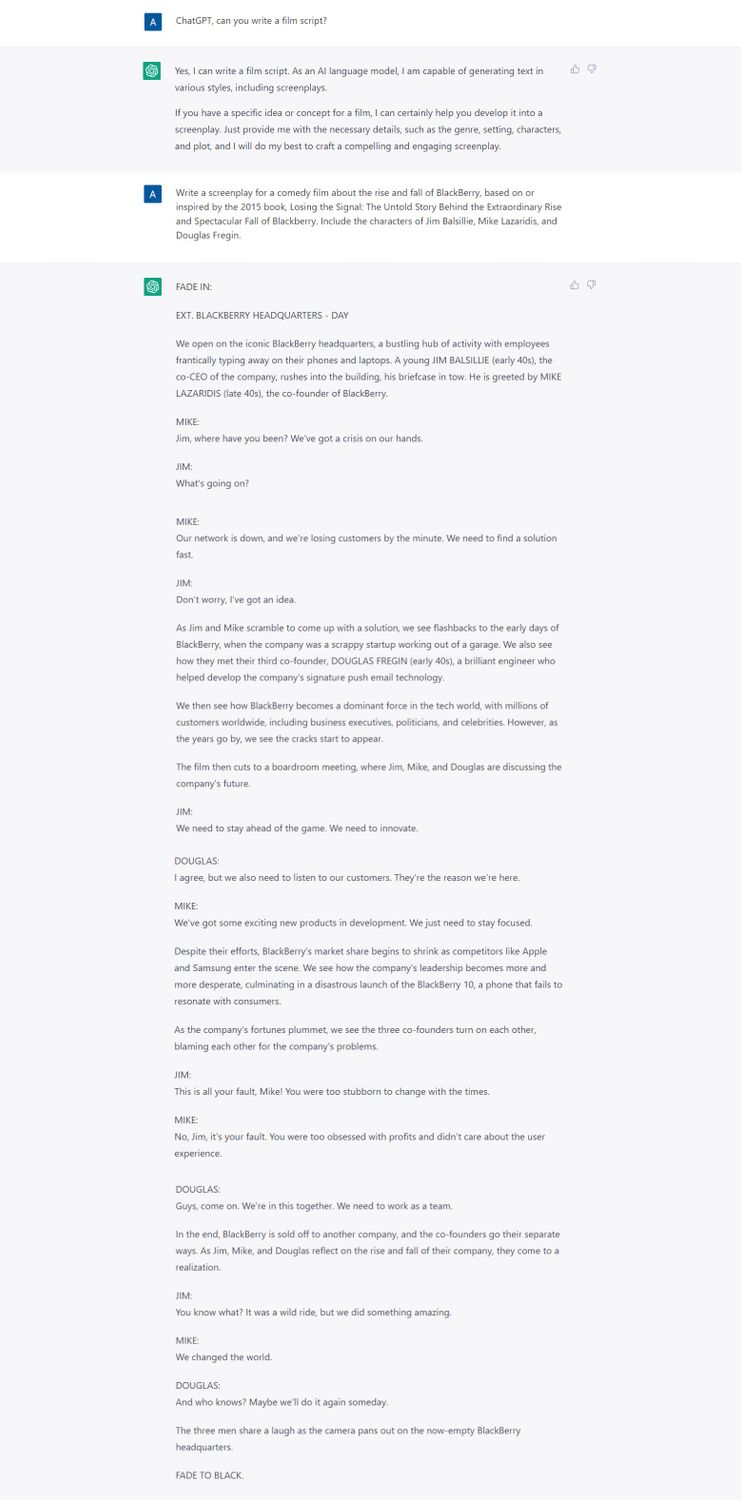Artificial Intelligence
“Once these three characters kind of got spun up and went winding, the movie did very, very much write itself.” When Matt Johnson said these words during the press conference of BlackBerry, a Canadian entry to the 2023 Berlinale Competition, a film that he directed, co-wrote, and co-starred in, I got an idea of how to approach the film and this piece. An idea that is perhaps amusing and entertaining but neither quite original nor very interesting. An idea that made me realise what I found lacking in the movie. Here it goes:

This brief conversation is not meant to suggest that the screenplay for BlackBerry could have been written by ChatGPT. After all, the three-month-old AI chatbot gets even the most basic details very wrong (for example, Doug is not the “third co-founder” of RIM). Also, the proposed ending couldn’t get cheesier and more different from that of the actual film (perhaps largely due to the ‘comedy film’ prompt). But the film is made and functions the same way as ChatGPT. That is, it draws from an existing pool of archetypal characters and visual techniques without adding much to what might be called an entrepreneur film sub-genre. That both scripts are pulling nearly the same scenarios from the 2015 book “Losing the Signal: The Untold Story Behind the Extraordinary Rise and Spectacular Fall of Blackberry” is not entirely surprising. It just speaks to how cliched and predictable such tech startup crash-and-burn stories AND their presentation can be.
Matt Johnson and Matthew Miller’s adapted screenplay plays out in a few uneven but nevertheless thrilling chapters, as it offers a look at the two inseparable and often conflicting sides of the tech industry – innovation and organisation – that are constantly in a disruptive face-off with cutthroat competition. The story starts in 1996. Mike Lazaridis (Jay Baruchel in his usual meek shtick) and Douglas Fregin (played by Johnson), co-founders of Research In Motion (RIM), introduce their rudimentary idea for the world’s first smartphone to alpha-male Wall Street-type guy Jim Balsillie (Glenn Howerton). The pitch turns into a dumpster fire, fuelled by both Mike and Doug’s lack of business acumen and Jim’s blinding Icarian ambition. But the latter also becomes the reason for the trio’s team-up shortly afterwards. When Jim demands to have the prototype made in less than a day, Mike cites Jim’s cheaply made, white noise-inducing intercom and refuses. “We’re not adding to the hiss. If I’m going to make it, I’m going to make the perfect prototype.” But, of course, he relents and that, in part, leads the three to create their new company, BlackBerry which at its height dominated nearly half the world’s smartphone market.
Deriving visual humour from its fly-on-the-wall camera language (think The Office) and its cast’s performance, BlackBerry grips the audience firmly in its first half. Tapping into his whimsy charisma as a person and an actor to the point of stealing the spotlight, Matt Johnson plays a version of himself once again, after his first two films The Dirties (2013) and Operation Avalanche (2016). Under his direction, even the deadpan pronunciation of Jim’s last name (in fact, his nickname in real life) becomes a laughing point. But BlackBerry’s heydays are short-lived. As competition from rivals such as Apple’s iPhone becomes fierce and Mike suffers from an ‘innovator’s block’, Jim resorts to shady stock dealings to fight a potential hostile takeover. How well that worked can be seen in the smartphone’s relegation into the footnotes of history.
“We didn’t want a movie about a phone or a company. Tech companies come and go”, says Jared Raab, the film’s director of photography and Johnson’s longtime collaborator, during a session with the Berlinale Talents. “Instead, we focused on the people within the story and on how to make people care [about the story and its characters].” While stellar performances from the three leads help bolster the film, it proves difficult to care about just their characters alone when the story seemingly doesn’t have any wider implications beyond them. Even Doug, the carefree vice president of operations who seemingly puts his employees first, espouses problematic values that are hard to sympathise with. Fighting against the company’s increasingly strict corporate culture in order to retain his frequent movie nights, video game sessions, and buffoonery at the office, Doug asks Mike – almost proudly – if he knows why their engineers are willing to work eighty hours a week and never see their family. This idealised vision of Silicon Valley work culture is simply bad taste.
Another bizarre aspect is the film’s insistence on partially blaming China for the downfall of the company. The camera doesn’t hesitate to show that Jim’s intercom system, their competitor’s Palm Pilot device, and the later BlackBerry phones are all low-quality, cheap products made in China. But the question of how much subpar Chinese components contributed to BlackBerry’s demise remains, especially when the vast majority of iPhones have been made in the same country since the 2000s.
The documentary visual style that worked so well in Johnson and Raab’s previous two indie projects struggles to justify itself this time around. Despite the blockbuster budget of somewhere between five to eight million Canadian dollars (albeit by Canadian standards), and the consequent high production value and the meticulously orchestrated camerawork, the feature film in documentary form doesn’t achieve the ‘spontaneous’ feeling it seeks.
BlackBerry is a surprise entry, welcome or not, that one wouldn’t quite expect in the Berlinale Competition. Johnson seems to agree, even if only in tongue-in-cheek manner. “We’re always told we couldn’t come here because our films were not serious. But then the pandemic happened and they didn’t have enough films”, he jokes to a full audience after the film’s premiere. “So, guess who came looking for us.” But who knows, maybe the Berlinale also indeed relented and settled for an imperfect stereotype that adds to the hiss.